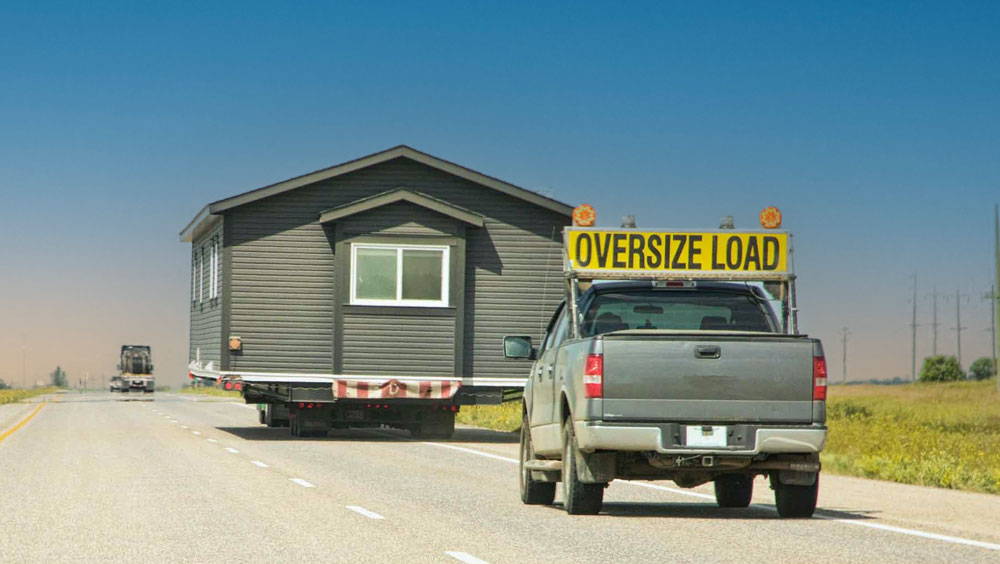Moving a mobile home can be a significant undertaking, both logistically and financially. However, for those looking to relocate to greener pastures or upgrade to a newer model, it is a necessary and worthwhile endeavor. While hiring professional mobile home movers is always an option, it can come with a significant price tag, making it prohibitively expensive for some homeowners.
Fortunately, there are ways to move a mobile home for free, or at least at an affordable price point. In this guide, we will explore the different methods for moving a mobile home without breaking the bank. From legal feasibility to DIY solutions, we will provide you with all the information you need to make an informed decision about your mobile home move.
Preparing For Your Move

Moving a mobile home can be a challenging task, but it can also be possible to do it for free if you plan carefully. Here are some tips to help you prepare for your move:
1. Check Local Regulations:
Consult with your local county treasurer or permit office to check the legal feasibility of moving your mobile home. Find out about building codes, mobile home communities, and any other requirements that may need to be met before the move.
2. Obtain Necessary Permits:
After checking the legal requirements, obtain all the necessary permits needed for your mobile home move. Permit processes vary depending on the state, county, and city where you reside. Check for delinquent taxes before acquiring permits.
3. Plan Your Route:
One of the most crucial things to do when moving a mobile home is to plan your route. Consider the width and height of your mobile home, along with any obstacles along your route like bridges, trees, or power lines. Plot out a clear and safe route that avoids these obstacles.
4. Remove Any Obstacles:
Before the moving day, remove any obstacles in front of your mobile home to ensure that the transportation process goes seamlessly. Don't forget to take down any signs, fences, or trees that can block the movement of your mobile home.
By following these preparation steps, you can significantly reduce the cost of moving your mobile home. Don't forget to hire licensed movers or mobile home transportation experts who can help you with full-service moves, and setup services, and ensure your move is as efficient and smooth as possible.
Finding A Free Mover

Moving a mobile home can be an expensive venture, but it doesn't have to be. There are several ways to find a free mobile home mover if you know where to look.
1. Local Government Offices
Your first stop should be your city or county government offices. Departments focused on housing, community development, or social services are particularly helpful. They can provide information about local programs or direct you to the right resources.
2. Social Services Agencies
Agencies dedicated to social services are valuable resources. They have comprehensive knowledge of assistance programs in your area and can advise on housing-related support.
3. Non-Profit Organizations
Organizations like Habitat for Humanity offer various forms of housing assistance. While their primary focus may not be on moving mobile homes, they can offer guidance or referrals to other resources.
4. Religious Organizations and Churches
Many religious groups have outreach programs aimed at assisting community members in need. Even if they can't help directly with moving your mobile home, they often have connections to those who can. Movers Corp has a great article on this process.
5. Community Centers
Local community centers are excellent for finding information about assistance programs. They often have bulletin boards or resource lists detailing local services and organizations.
6. Online Resources
Websites such as 211.org provide searchable databases of local services across the United States. Additionally, a targeted internet search can yield localized results relevant to your specific needs.
7. Local Libraries
Don't overlook your local library. Libraries have resources on community services, and librarians can assist in guiding you to the right information.
8. Social Media and Online Forums
Platforms like Facebook have local groups where you can inquire about assistance. These platforms can connect you with community members who might have relevant information or resources.
It's important to note that finding a free mobile home mover may not always be possible in all areas. In such cases, you can explore other options to reduce the cost of moving your mobile home. These options may include negotiating with professional movers for a lower price or transporting the mobile home yourself if you have experience in driving heavy vehicles. Regardless of the option you choose, it's essential to plan ahead and research all available options to make your move as smooth as possible.
Moving Your Mobile Home

Moving Your Mobile Home: Step-by-Step Guide
Moving a mobile home can be a daunting task, but with careful planning and preparation, you can do it successfully without breaking the bank. Here's a step-by-step guide to moving your mobile home for free:
1. Disconnect Utilities:
Before you start, make sure to disconnect the utilities to your mobile home. This includes electricity, gas, water, and sewage. Contact your service providers and schedule a disconnect date at least a week before the move. This will ensure that you are not billed for services you are not using and that there are no safety hazards during the move.
2. Protect Your Home:
Next, ensure that your mobile home is well protected during transport. Close all windows and doors tightly, and secure all loose items inside the home. Remove any obstacles such as tree branches, lawn decorations, and furniture that may obstruct your route while moving. You can also invest in protective plastic sheets to cover the windows and doors to prevent damage during the move.
3. Secure Your Home to the Mover's Trailer:
Now it's time to secure your mobile home to the mover's trailer. This is where it's crucial to hire a professional mover or rent a trailer with the right equipment to move your mobile home safely. The mover will use hydraulic jacks to lift your home off the ground and position it onto the trailer. Make sure that the home is secured with straps, chains, and other equipment to avoid shifting during transport.
4. Reconnect Utilities:
After the move, reconnect your utilities to your mobile home. Contact your service providers again, and schedule a reconnect date. It's essential to have these services up and running before you start settling into your new place.
In conclusion, moving your mobile home for free requires careful planning, patience, and attention to detail. By following these steps, you can save money and ensure a successful move. Remember to check with your local county treasurer's office to obtain any permits required for moving a mobile home, and check the legal feasibility of moving your home to a new location. Make sure you also factor in any additional costs such as property taxes, building codes, and setup services. Good luck with your move to greener pastures!
How Long Does The Process Take?
The length of time it takes to move a mobile home depends on several factors, including the size and weight of the home, the distance of the move, and weather conditions. Moving a small trailer across town can usually be completed in one day. However, larger moves may take longer depending on the complexity of the job. Generally speaking, it can take anywhere from two to five days to complete the entire process.
Post-Move Considerations
Moving your mobile home to a new location can be a major transition, but there are some important post-move considerations you should keep in mind to ensure a smooth transition. These considerations include inspecting your home, making necessary repairs, and setting up your home at the new location.
Inspect Your Home:
The first thing you should do after moving your mobile home is to inspect it thoroughly. Check for any damages that may have occurred during transport and make note of any repairs that need to be made. Some common areas to check include the roof, windows, doors, siding, and flooring. You should also inspect the plumbing and electrical systems to make sure everything is working properly.
Make Necessary Repairs:
Once you have completed your inspection, make any necessary repairs to ensure that your home is safe and comfortable. This may include fixing leaks, repairing damaged siding or flooring, or updating outdated electrical or plumbing systems. It's important to address these issues as soon as possible to prevent further damage and to ensure that your home is functioning properly.
Set Up Your Home At The New Location:
Once your home is in good repair, it's time to set up your home at the new location. This may include leveling your home, connecting utilities, and setting up any necessary structures such as porches or sheds. If you are moving to a mobile home park or community, you may also need to check with the park management to ensure that you are meeting any specific requirements or regulations.
By following these post-move considerations, you can help ensure a successful and stress-free transition to your new home. Remember to take the time to thoroughly inspect your home, make any necessary repairs, and set up your home at the new location so that you can enjoy your new surroundings with peace of mind.
Conclusion

In conclusion, moving a mobile home for free may seem like a daunting task, but it can be done with the right preparation and research. Before embarking on this journey, it's important to inspect your home and make any necessary repairs to ensure that it is in good condition for transport. Once you've arrived at your new location, take the time to set up your home properly and check with any applicable regulations or requirements in your mobile home community. While professional movers may offer full-service moves, this can often come with additional costs that may not fit within your budget.
By following these tips, you can save money and experience a successful move to greener pastures. However, always keep in mind that moving a mobile home involves legal feasibility, such as obtaining necessary permits, complying with building codes, and submitting a certificate of title, among others. If you are unsure about the legal aspect of moving a mobile home, reach out to the appropriate authorities such as the county treasurer's office or the department of motor vehicles to ensure that you are compliant with the law. Overall, moving your mobile home on your own can be done with careful planning and execution, making the transition to your new home as smooth as possible.
Frequently Asked Questions:
Frequently Asked Questions About Moving a Mobile Home For Free:
Is it really possible to move a mobile home for free?
Yes, it is possible to move a mobile home for free. Some individuals or organizations may offer to move your mobile home for free as a way to acquire the home themselves or to help out someone in need. However, finding a free mover may be a challenge and it's important to be aware of the potential risks.
Are there any risks associated with using a free mover?
Yes, there are risks associated with using a free mover. Since they are not licensed professionals, they may not have the necessary expertise to move your mobile home safely. Additionally, they may not carry insurance to cover any damages that may occur during the move. It's important to thoroughly research any free mover before agreeing to their services.
How long does it typically take to move a mobile home?
The length of time it takes to move a mobile home can vary depending on the distance and terrain of the move, as well as the size and type of the home. On average, it can take anywhere from a few days to a few weeks to complete the move.
What should I do if I can't find a free mover in my area?
If you can't find a free mover in your area, there are still options available. You can contact professional mobile home movers who specialize in relocating mobile homes. Although they come with an average cost, they offer full-service moves and are licensed experts in transporting mobile homes. You can also inquire with your local mobile home community talk or property management to see if they offer any mobile home moving services or know of any affordable options.
Moving a mobile home can be a daunting task, but it's important to do your research and choose the option that best fits your needs and budget. Don't forget to consider additional costs such as permits, setup services, and property taxes when planning for your move. By being prepared and informed, you can successfully move your mobile home to greener pastures.


